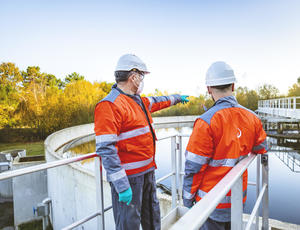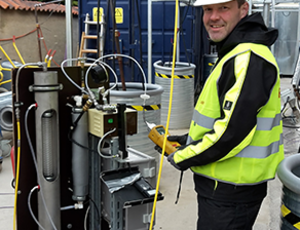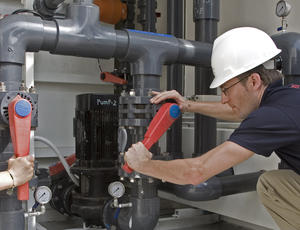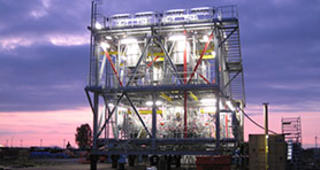Solvent removal and recovery in the semiconductor industry.
Overview
The microchip manufacturing industry is very challenging; millions of liters of water are consumed every day for its processes and it requires sophisticated technologies to treat the wastewater. In particular the solvents used to clean wafers contaminate the wastewater streams, making these difficult to treat. Isopropyl alcohol (IPA) is one such solvent that is difficult to remove and which can cause process issues in the wastewater treatment and/or the downstream reuse facility. The industry is constantly faced with challenges in finding efficient solutions when it comes to the removal and recovery of solvents from IPA waste streams.
How does MPPS work?
MPPS removes and recovers solvents by means of adsorption on dedicated media. By applying steam regeneration of the loaded media, the solvents are recovered in a concentrated form. This makes them suitable for either reuse, or if that is not possible, the concentrate can be disposed of as high caloric waste. Often the purified water can be reused.
- Solvent recovery: concentrated solvents can be reused for other processes or sold as a valuable resource
- Water efficiency: ultrapure water production saved while reducing fresh water intake from water reuse
- Compliance: by adjusting IPA concentration levels in the stream to achieve optimal results while meeting safety regulations.
- Footprint: the MPPS units can be tailored for installation in spaces with significant size constraints.
- Performance assurance without budget surprises: our Performance Guarantee Service (PGS) ensures the functionality of the media at a fixed annual fee.

Features and benefits

No chemicals used

No sludge or waste gas produced

Removes dissolved solvents with efficiency of 99.9%

Fully automated

Low energy consumption

Minimal operator intervention required
Applications
Services
We offer a range of services:
Contact
Over the past few decades we have successfully applied MPPE to remove and recover toxic components from water. Now, with MPPS, a whole new range of applications is emerging, allowing us to provide you added value by efficiently recovering solvents from wastewater, enabling reuse of both solvents and purified water.

Erik Middelhoek
Managing Director
Contact Erik through his LinkedIn account
FAQ about Macro Porous Polymer Sorption
Can IPA (isopropyl alcohol) loaded wastewater be treated?
Yes, in most cases we are able to isolate the IPA from water, though some criteria need to be met. Currently we have demonstrated that the IPA feed concentration between 500 - 12.500 ppm can be treated.
Can IPA (isopropyl alcohol) be recovered?
The IPA that is removed by the media is regenerated by steam, resulting in a more concentrated solution having 5 to 25 wt% IPA.
Why sorption rather than extraction?
Macro Porous Polymer Extraction (MPPE) is a liquid/ liquid extraction system in which the extraction liquid is immobilized in porous polymeric particles. These particles will contain up to 70% of the volume of the extraction liquid. When feed water is in contact with the MPPE media, solvents migrate from the water into the extraction liquid. However, polar components, like IPA, have a low affinity for the extraction liquid. As a result, a new type of media has been applied that is based on sorption rather than extraction and is therefore indicated as MPPS. The process in which the two types of media are used is identical and has been used for decades in other industries, specifically oil and gas.
Case Study

A major player in the healthcare market is generating a 1.25% IPA wastewater stream that is disposed of. By installing a containerized mobile unit, the stream is reduced by more than a factor 10, while the treated water is meeting discharge requirements. Besides significant savings, the client is investigating reuse options for the treated water.










